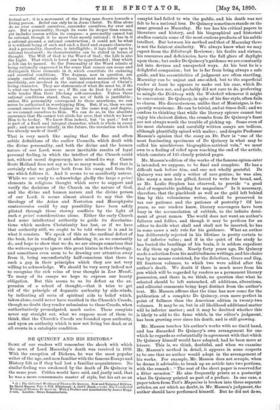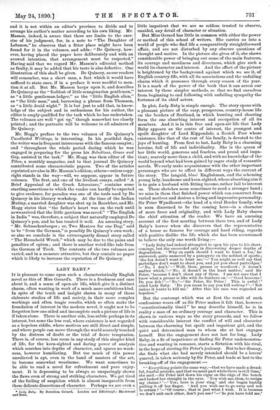DE QUINCEY AND HIS EDITORS.*
SOME of our readers will remember the shock with which the news of Lord Macaulay's death was received in 1859. With the exception of Dickens, he was the most popular -writer of the age, and men familiar with the famous Essays and History felt as if they had lost a familiar acquaintance. No similar feeling was awakened by the death of De Quincey in the same year. Critics would have said, and justly said, that he was a more consummate master of style, but his art as an • (1) nie Collected Writings of Thomas De Quincey. New and Enlarged Edition. By David Masson. Vole- I.OirIL Edinburgh: A and C. Black.—(2.) The Uncollected Writings of Thomas De Quinrey. With a Preface and Annotationsby James Hogg. 2 vols. London : Swan Sonnensehein. essayist had failed to win the public, and his death was not felt to be a national loss. De Quincey sometimes stands on the same ground as Macaulay. He too has his critical papers in literature and history, and his biographical and historical studies contain some of the most curious products of his subtle intellect. But between his method and that of Macaulay there is not the faintest similarity. We always know what we may expect from the Edinburgh Reviewer ; his faults and virtues, his resources and deficiencies, have the full glare of daylight upon them ; but under De Quincey's guidance we are constantly led into devious and unexpected ways. At his best he is a delightful companion ; but he is far from being always a safe guide, and his eccentricities of judgment are often startling. Macaulay can be unjust and one-sided, but to the superficial reader at least he appears to make out his case, which De Quincey does not, and probably did not care to do, preferring to mingle the Dichtung with the Wahrheit whenever it might be convenient. Be Quincey, in spite of his fine style, often fails to charm. His discursiveness, unlike that of Montaigne, is fre- quently wearisome. He can be trivial, and at times dull; and we confess to thinking that while the literary epicure cannot but enjoy his choicest dishes, the crumbs from Be Quincey's feast are not always worth the trouble of picking up. Some even of his most elaborate and carefully written essays are tedious, although plentifully spiced with malice; and despite Professor Masson's opinion that the essay on Dr. Parr is "one of the most fascinating specimens of Be Quincey in what may be called his mischievous biographico-satirical vein," we must own to a feeling of relief upon reaching the end of the article, which consists of 145 closely printed pages.
Mr. Masson's edition of the works of the famous opium-eater is intended, we suppose, to be final and complete. He has a difficult task before him, and one not wholly grateful. Be Quincey was not only a writer of rare genius ; he was also, like many a man less gifted, forced to write for bread, and, as Mr. Leslie Stephen has observed, to provide "a good deal of respectable padding for magazines." Is it necessary, therefore, that the pinchbeck as well as the gold left behind him by this voluminous writer, should be preserved to tax our patience and the patience of posterity ? Of late years, as our readers know, literary scavengers have been busy in the accumulation of rubbish, to the infinite detri- ment of great names. The world does not want an author's failures and follies, and though it may be perilous for an editor to decide what shall and shall not be inserted, he has in some cases a safe rule for his guidance. What an author has deliberately rejected in his lifetime is pretty certain to be of inferior value ; and if in the quiet of the study he has buried the bantlings of his brain, it is seldom expedient to dig them up again. Nearly forty years ago, De Quincey made a selection from his multitudinous writings, and his choice was by no means restricted, for the Selections, Grave and Gay, fill fourteen volumes, to which two were added after the author's death. We doubt if there is much more from his pen which will be regarded by readers as a permanent literary possession, and there is, we think, no question that what he selected should be left untouched, all additions, alterations, and editorial comments being kept distinct from the author's text. Mr. Masson affirms that the time has now come for the publication of a complete De Quincey, even more perfect in point of fullness than the American edition in twenty-two volumes. It may be so, but in all likelihood additional matter will be inferior matter ; and it may be doubted whether this is likely to add to the fame which, in the editor's judgment, has been growing ever since his death, and, is still growing.
Mr. Masson touches his author's works with no timid hand, and has discarded De Quincey's own arrangement for one which he regards as substantially in agreement with that which Be Quincey himself would have adopted, had he been more at leisure. This is, we think, doubtful, and when we examine Mr. Masson's method in detail, it appears in some respects to be one that no author would adopt in the arrangement of his works. For example, Mr. Masson does not scruple, when he deems it advisable, to break up an article into two portions, with the remark : "The rest of the short paper is reserved for a fitter occasion." He also frequently prints as a postscript what De Quincey printed as part of a preface. In one case, a paper taken from Tait's Magazine is broken into three separate articles, an act which no doubt, in Mr. Masson's judgment, the author should have performed himself. But he did not do so,
and it is not within an editor's province to divide and to arrange his author's matter according to his own liking. Mr. Masson, indeed, is aware that there are limits to the exer- cise of his judgment, for, in a note to "The Daughter of Lebanon," he observes that a fitter place might have been found for it in the volumes, and adds : "De Quincey, how- ever, having placed the paper here deliberately and with an avowed intention, that arrangement must be respected." Having said that we regard Mr. Masson's editorial method as faulty, it may be added that his taste is also defective. One illustration of this shall be given. Be Quincey, as our readers will remember, was a short man, a fact which it would have sufficed to state once, if in a preface it were needful to men- tion it at all. But Mr. Masson harps upon it, and describes Be Quincey as the "feeblest of little sexagenarian gentlemen," as "a little gentleman-lodger," as the "little English alien," as "the little man," and, borrowing a phrase from Thomson, as "a little druid wight." It is but just to add that, in know- ledge of the subject and in enthusiasm for his author, the editor is amply qualified for the task which he has undertaken. The volumes are well "got up," though somewhat too closely printed ; and the portraits will be welcome to all admirers of Be Quincey.
Mr. Hogg's preface to the two volumes of De Quincey's Uncollected Writings, is interesting. In his youthful days, the writer was in frequent intercourse with the famous essayist; and "throughout the whole period during which he was engaged in preparing for the press his Selections, Grave and Gay, assisted in the task." Mr. Hogg was then editor of the Titan, a monthly magazine, and to that journal Be Quincey contributed some characteristic papers. Two of the articles reprinted are also in Mr. Masson's edition; others—unless copy- right stands in the way—will, we suppose, appear in future volumes. The first, and one of the liveliest essays, called "A Brief Appraisal of the Greek Literature," contains some startling assertions to which the reader can hardly be expected to give credence, for paradox was one of the tools used by De Quincey in his literary workshop. At the time of the Indian Mutiny, a married daughter was shut up in Roorkhee, and Mr. Hogg states that "the father's heart was on the rack until news arrived that the little garrison was saved." "The English in India" was, therefore, a subject that naturally employed Be Quincey's pen, and he has treated it well. An amusing story, "Mr. Schna,ckenberger ; or, Two Masters for one Dog," said to be "from the German," is possibly De Quincey's own work; so also we conclude is the extravagantly dismal story called "The Household Wreck," which may be due to the pains and penalties of opium ; and there is another weird-like tale from the German of Tieck. The contents of the two volumes are varied, and in a measure attractive, but they contain no paper which is likely to increase the reputation of Be Quincey.



































 Previous page
Previous page